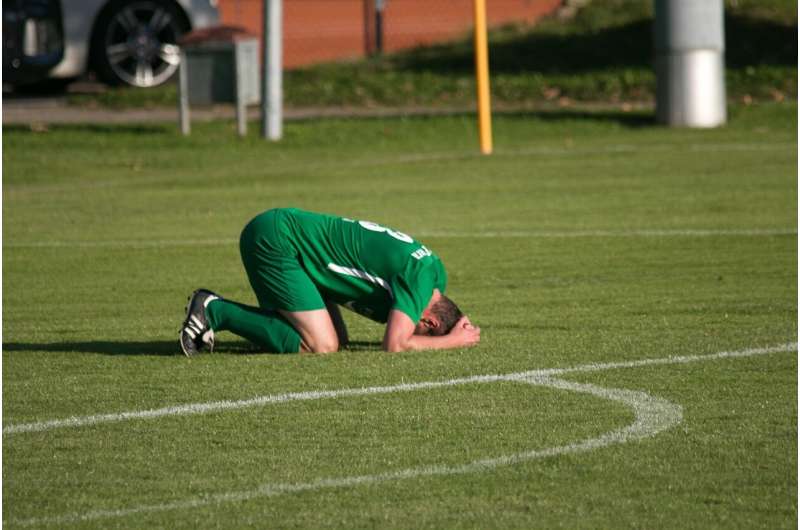This article has been reviewed according to Science X's editorial process and policies. Editors have highlighted the following attributes while ensuring the content's credibility:
fact-checked
trusted source
proofread
College athletes found to experience high rates of mental health stigma

College athletes playing this fall have spent months practicing and preparing for the season.
But the stressors they face—from the pressure to win every week to balancing academic workloads and maintaining their physical health—can take a toll on this group of students.
College of Education & Human Development Assistant Professor Lauren Beasley and Brigham Young University's Steven Hoffman co-authored a study in the Journal of Sport and Social Issues highlighting college athletes' mental health literacy and how to reduce stigmas around mental health diagnoses on college campuses.
For this study, Beasley and Hoffman sent an online survey to 205 undergraduate student athletes participating in National Collegiate Athletic Association sports and 205 non-athlete undergraduates at NCAA institutions to measure their mental health knowledge, experiences and attitudes.
Their results show that student athletes didn't have statistically different levels of mental health literacy compared to their non-athlete counterparts—a finding that other researchers have corroborated.
Those who had experienced mental health issues firsthand had higher mental health knowledge than their peers, had more exposure to mental illness and didn't have the same negative perceptions of mental illnesses.
Beasley and Hoffman also found that students of color showed higher rates of experience with mental health issues than their white counterparts, and men tended to have more negative perceptions of mental illness compared to the women in this study.
Both groups of students in the study had average levels of mental health literacy, but both also tended to perceive mental health diagnoses in a negative light. They also found that student athletes specifically experienced high rates of mental health stigma. This suggests that mental health campaigns in athletic departments and on college campuses are working at the functional level by increasing mental health knowledge, but are not yet meaningfully decreasing mental health stigma.
To help increase mental health literacy and decrease the stigmas associated with diagnoses, universities could implement culturally responsive initiatives on campus that encourage mental health awareness and provide resources for addressing students' needs.
Student athletes can play a key role in promoting mental health literacy at their respective universities. For example, the University of Michigan's athletics department created an initiative called "Athletes Connected" that recorded student athletes discussing their mental health diagnoses and their experiences with therapy. These videos were circulated on campus and researchers found that student athletes were more likely to encourage their teammates to seek help and to address their own mental health concerns after watching the videos.
"Student athletes are in a unique position to influence the broader culture on their college campus due to their prominent status, and because they already have contact both with the athletic community on campus and the general student body," Beasley and Hoffman wrote. "Therefore, having student athletes as the leaders of mental health campaigns could be a promising strategy to decrease mental health stigma campus wide."
However, as the study found high rates of mental health stigma among student athletes, more work needs to be done to decrease internalized stigma of athletes. Thus, the authors recommend that coaches, trainers and other college athletics staff establish a team culture that prioritizes mental health.
Coaches who take a "tough it out" approach to their athletes' mental health concerns can entrench negative attitudes about mental health and unwittingly discourage students from seeking help.
"Without buy-in from coaches and other athletic staff, the culture of elite sport that perpetuates mental health stigma will likely continue down an unhealthy path," the authors wrote. "To create such buy-in, individual universities, divisions and the NCAA should consider mandating coaches and other staff to receive mandatory mental health literacy training from trained mental health professionals."
More information: Lauren Beasley et al, A Descriptive Look at the Mental Health Literacy of Student-Athletes, Journal of Sport and Social Issues (2023). DOI: 10.1177/01937235231171369




















